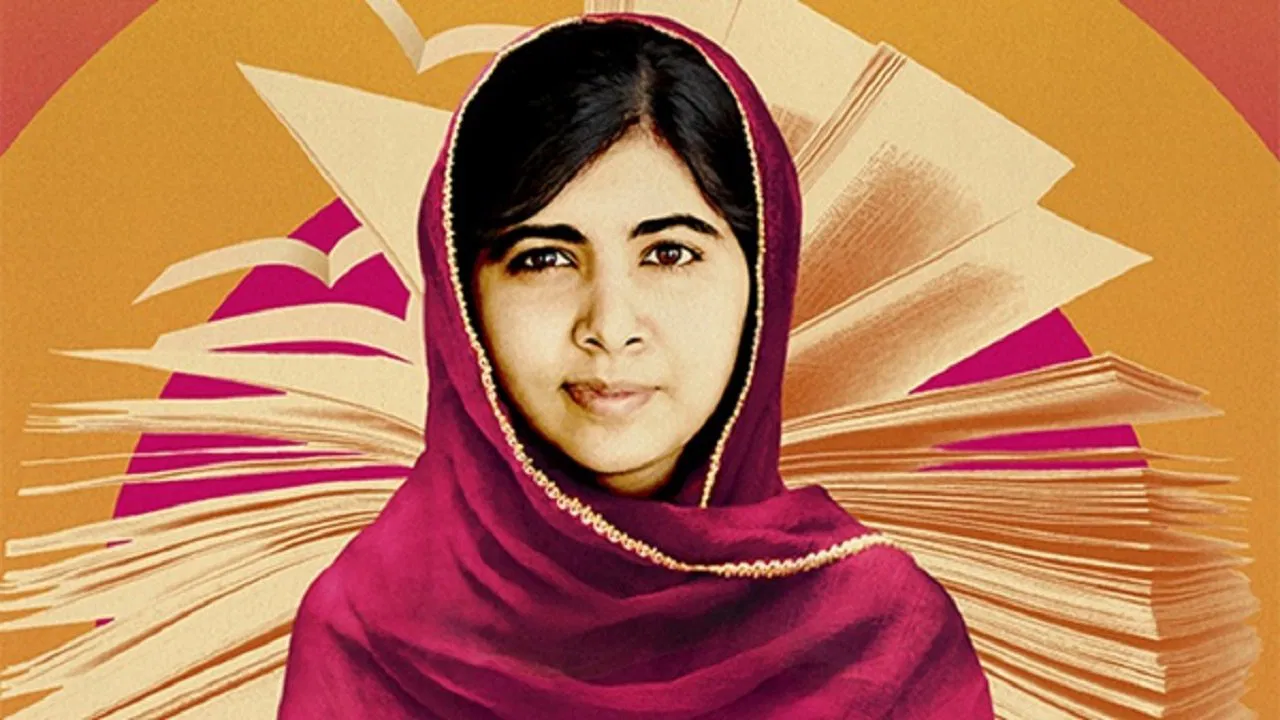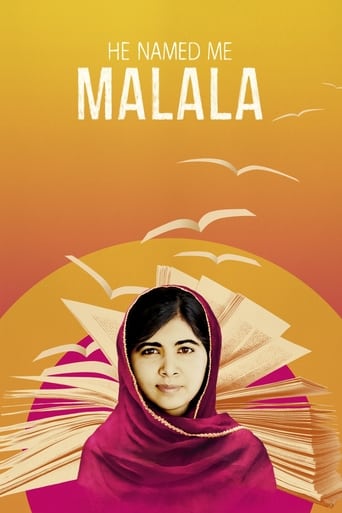IslandGuru
Who payed the critics
Portia Hilton
Blistering performances.
Gary
The movie's not perfect, but it sticks the landing of its message. It was engaging - thrilling at times - and I personally thought it was a great time.
Cristal
The movie really just wants to entertain people.
dj-shabbir-k
this is the Excellent documentary i ever seen in Pakistan every body talk about Malala is fake but this documentary show us how she survive i am also from Pakistan i respect women The name Malala is a variant of Malalai, which means "sad, grieved" in Pashto. This was the name of a Pashtun woman who encouraged the Afghan forces during the 1880 Battle of Maiwand against the British. Another bearer of this name is Malalai Joya (born 1978), an activist, writer, and a former politician from Afghanistan this is the latest documentary from director David Guggenheim, best known for previous efforts such as Waiting for Superman, and It Might Get Loud. Here he tackles a difficult task, namely how to make an enticing documentary about a remarkable person, without coming across as simply wanting to 'glorify' that person. The answer, as it turns out, is quite simple: show us that person (in this case Malala) in their natural environment, and let us observe the REAL person. And then Guggenheim has another ace up his sleeve: he lets us catch glimpses (and more) of how the Taliban slowly but surely changes the Swat Valley in Pakistan, where Malala and her family lived. I must say, I was quite shocked at what I saw: the Taliban's brutality and determination knows no boundaries. As Malala (or was it her dad) observes at one point: "For the Taliban, it is not about faith, it is about power". Speaking of Malala's dad, it turns out he is quite remarkable well. I wondered why the movie wasn't simply called "I Am Malala" (her autobiography, from which the movie of course borrows), but now that I've seen it, it makes perfect sense, as this is a documentary not just about Malala but also very much about her dad. There is various remarkable archive footage in the documentary about the Taliban, her dad, and of course Malala herself. I must admit that I was worried how the makers of this documentary were going to fill an hour and a half in a way that would keep my attention. I shouldn't have worried. This is a moving documentary that, frankly, left me even more in awe of Malala than I already was. And to think this young lady is still only 18 years old as we speak! I am humbled and also a little inspired after seeing this.
Olivia Temple
Most people know her name and she has become a recognized figure throughout the world since winning the Nobel Peace Prize in 2014. But very few know anything about 17 year-old Malala's new life in the UK since she was flown over for emergency medical treatment after her school bus was ambushed and she was shot in the face by the Taliban in the Swat Valley in Pakistan in 2012. The director Davis Guggenheim followed Malala and her family for a year as she travelled the world to speak about her conviction and passion to promote the rights of girls globally to have an education. This took the film maker to Nigeria and Jordan where she spoke to Syrian refugees and to the UN where Malala addressed the Congress. But it is the insight Guggenheim has into the every day home life of the Yousafzai family in Birmingham that is such a charming and magical revelation. He was enchanted by the family and taken into their confidence and trust as is apparent from scenes around the kitchen table and particularly with the deep and very intense relationship between Malala and her father Ziauddin. He named his daughter after the Pashtun heroine Malalai of Maiwand who was assassinated for speaking out. Malala's dignified but shy mother and her cheeky younger brothers are asked about their views on what has happened to their life and how they feel about it. The family has a lot of fun and laughter and Malala is very much a young girl, giggling as she looks at magazine pictures of young cricketers and insisting it is only the cricket she is interested in. Traumatic images of Malala's treatment at the Birmingham hospital where she spent many months, when it was not known if she would survive, let alone be able to speak again, firmly remind us of how the odds were stacked against her and how very miraculous her recovery is as well as the dedication of the team who attended her rehabilitation. Images of the idyllic region of the Swat Valley are re-created by animator Jason Carpenter of Carpenter Bros Animation, an inspired choice, as their delicate creation evokes the beauty and simplicity of the life that the family have had to abandon. Previously unseen news footage of areas where the Talban burned down schools and collected television sets and videos which were burned on a pyre like so many witches, are a brutal reminder of the insanity that has caused such misery to so many. Malala's father condemns their actions and their brand of Islam as evil and clips of him speaking out against them to his compatriots are shown which are scorching in their audacity and bravery. What stands out like a tower of strength is the unbending determination and dedication of Malala to devote her life to the education of all girls everywhere. Her voice is like a spire of light, strong and daunting and she seems to have no fear of speaking to prime ministers and Presidents alike. When Guggenheim asked her if, when she met President Obama she had challenged him about drones killing villagers and women and children she replied with indignation "Of course!". When Malala's name was announced as the recipient of the Nobel Peace prize in 2014 we see her back at home flinging herself into her father's arms and they hug and weep silently, not just with relief and joy but with a love and mutual understanding that knows no bounds. This wonderful insightful film should be shown in all schools all over the world and shines like a beacon of hope to all of us. She is right: one person can change the world.
Ramesh Khanna
In a world where there is a dearth of real life role models, Malala is a shining star. She comes across as an intelligent, deep and at the same time a normal teenage girl.This is a good movie, if not great that everyone from 10 and above could see, especially children. We take so many things for granted whereas the same basic rights are completely restricted for a vast majority of others.What is somewhat disturbing is that all this attention and spotlight could potentially rob her life of the usual fun that a regular teenager would be able to enjoy...In my country/state, there was a poet "Mahakavi Bharathi" who lived some 100 years back and advocated & campaigned for women's rights and education. Malala is the equivalent of Poet Bharathi's "Pudumai Penn" (Modern Lady). Engaging and captivating movie. Malala, you are my real life Hero. I salute you!!
Lloyd Bayer
Having saved the world so many times, how many superheroes have you seen on the cover of Time magazine? That's right, they don't exist. But real heroes do and they don't need superpowers or a fancy costume to stand in the face of injustice. As a defender of truth and equality in the times we live in, this is the incredible true story of Malala Yousafzai, a real hero whose only weapon is indelible courage. From Academy Award winning director Davis Guggenheim and produced by Imagenation Abu Dhabi, He Named Me Malala is part documentary, part animation, and part live action, but wholly narrated by Malala and her father Ziauddin Yousafzai. Although the use of animation is questionable, these segments are used as plot points leading up to the day when Malala was shot in the head by the Taliban. If not, Guggenheim would have had to reenact those moments using real actors but at the risk of discounting the authenticity of this documentary. Along with actual news footage and still images, much of the story is a reiteration of her courage, her ordeal, her survival, and her dedication as a right-to-education activist. While this might seem all too familiar to anyone following the news, the documentary doesn't feel scripted or even overladen with praise. And why shouldn't it be? This is about the assassination attempt on a 15-year-old girl whose only crime was speaking out on her basic right to an education.Inspired by her memoir I Am Malala, the film begins in Birmingham, United Kingdom, in 2013, where the Yousafzai family is based post recovery period. Although you don't see a scar, Malala bears a lopsided smile whenever she is asked a question. There is sadness in her eyes along with bashful insecurity but also wisdom and an inner strength much beyond her age. "Three years have passed", she recalls, not of the attempt on her life, but having left her beautiful home in the Swat Valley province of Pakistan. Surrounded by Afghani Mountains, we are shown images of this scenic region (which is always presented as a place of bloodshed and massacre by the media) before Malala begins her story. This is also where the narrative shifts from Malala to her father, beginning with his version of a 'love marriage' to Malala's mother. As a self-taught public speaker, Ziauddin's story is as incredible as his daughter Malala's. While it's clear where the latter gets her courage and insight from, it's the development of a symbiotic father-daughter relationship that makes this a documentary that must be seen.Riveting, and at times overwhelming, He Named Me Malala is a delight to watch, and so is Malala Yousafzai. Guggenheim could have stuffed this film with geopolitical propaganda and ended it with a bleeding cry for justice. When asked if they caught the person who shot his daughter, Ziauddin replies "Not a person, but an ideology". Likewise, Malala has her own quips, and along with her brothers and her father add refreshingly funny moments given the subject matter. At the same time and given her status as a public figure, at no point does Malala seem like a celebrity, nor does she see herself that way. What you do see is a shy teenager but one that is utterly brave and honest with the kind of raw dedication that outflanks millions, possibly billions, of people her age. The fact that Malala was featured on Time magazine twice, followed by her becoming the youngest ever recipient of a Nobel Peace Prize in 2014 proves my last statement. He Named Me Malala is highly inspirational and the type of film where you clap in the end, only to realize that you've clapped too early. Malala is only 18 now, but she has achieved far more than any of us ever will. That itself is worth a standing ovation and I wish her a long life of success in her fight for equality and education with many more accolades to come.

